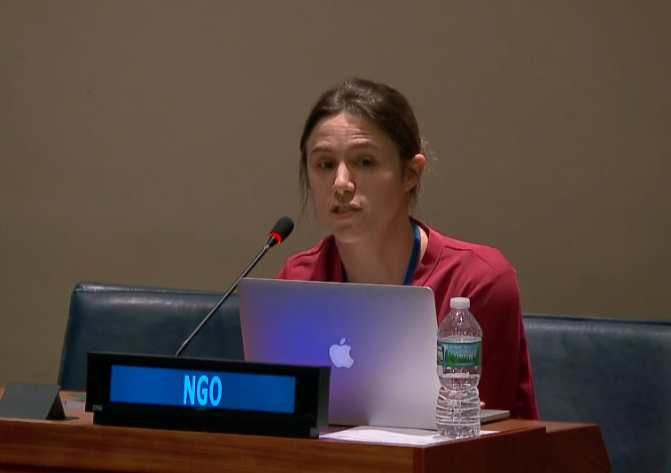Delivered by Kate Donald, of the Center for Economic & Social Rights, speaking on behalf of the NGO Major Group
 Thanks to these two panels for highlighting some innovative practices in terms of measurement of the SDGs. Unfortunately, many of the efforts we are seeing are not so good. It is crucial that data and monitoring gives due weight to all the aspects of the agenda, is placed in context and does not lose the forest for the trees. It also has to be channeled into processes for accountability and for policy change. Quality official data is critical, but we also need to recognize that all data has power dynamics embedded in it – even in the choice of what to measure in the first place. There is a wealth of insightful data available from civil society and NGOs around the world, including data that is gathered in empowering and participatory ways. It would be a huge mistake not to use it.
Thanks to these two panels for highlighting some innovative practices in terms of measurement of the SDGs. Unfortunately, many of the efforts we are seeing are not so good. It is crucial that data and monitoring gives due weight to all the aspects of the agenda, is placed in context and does not lose the forest for the trees. It also has to be channeled into processes for accountability and for policy change. Quality official data is critical, but we also need to recognize that all data has power dynamics embedded in it – even in the choice of what to measure in the first place. There is a wealth of insightful data available from civil society and NGOs around the world, including data that is gathered in empowering and participatory ways. It would be a huge mistake not to use it.We’d like to make a couple of comments about one of the major compendiums of SDG data - the Secretary General’s Progress Report. While we applaud the efforts of UN Statistics Division, the report has some major flaws that must be remedied in future if it is to accurately monitor implementation and spur more effective action. As we all know, what we measure really matters. The Progress Report has huge gaps, missing out many targets (even ones with Tier 1 indicators) and is almost entirely devoid of contextual analysis of global trends. This results in a very skewed and misleading picture, and risks invisibilizing some of the most essential elements of the SDGs (including those elements most closely linked with human rights). As a simple but powerful action point, we urge the UN to lift the word limit on the Progress Report – absurdly, not much more than 10,000 words for a report purporting to cover 169 targets for the whole planet – and therefore allow a much more detailed, nuanced, rich picture of what we are doing right and where we are way off track.
And unfortunately, the experience of civil society shows that for the most part we are way off track. The NGO Major Group position paper signed by over 100 organizations says, “For the SDGs to be truly transformative, urgent action is required to restructure global systems to orient them towards equity and justice.”
We hope that the 2018 HLPF will be the moment when a critical mass of governments realize the scale and urgency of the task ahead, and commit to real action towards what they promised in the 2030 Agenda: “transforming our world.”